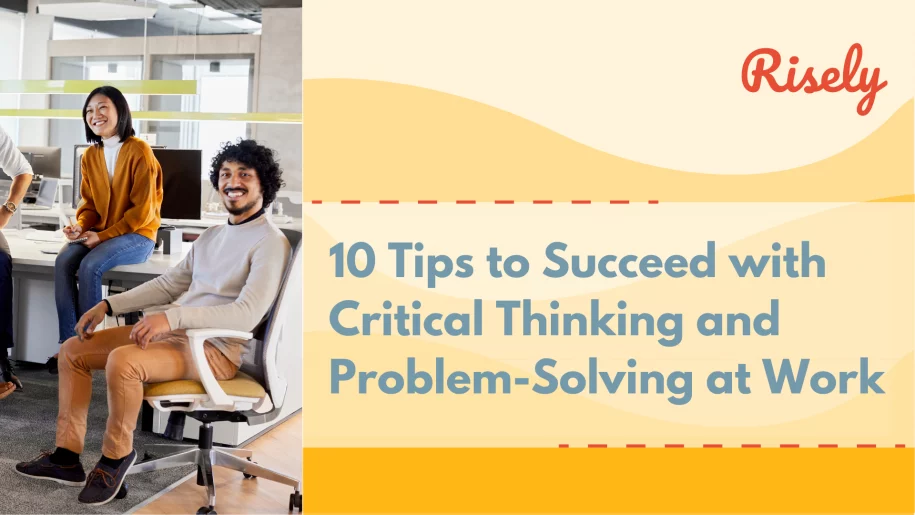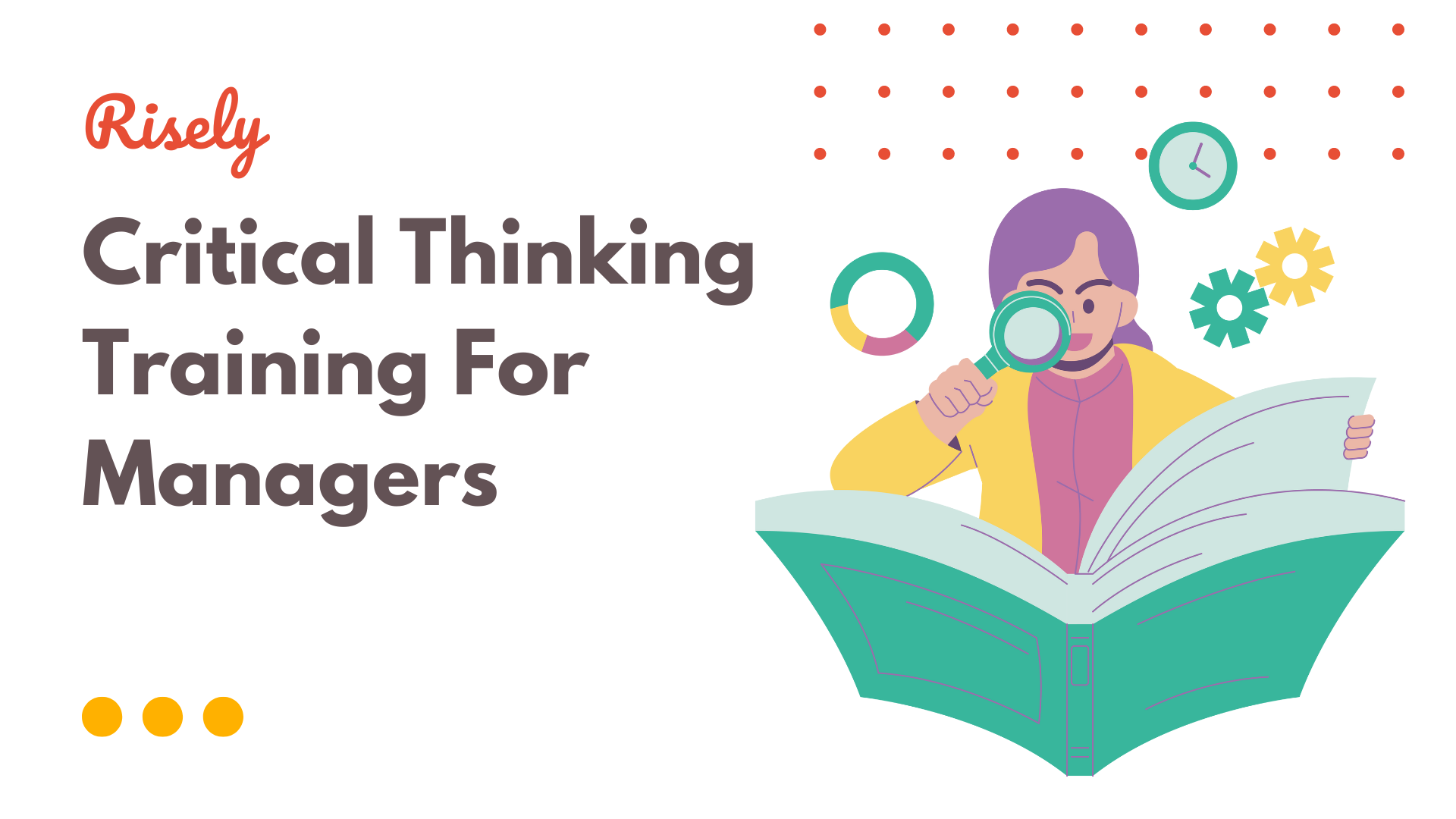10 Tips to Succeed with Critical Thinking and Problem-Solving at Work
Critical thinking and problem-solving are essential skills for success in both personal and professional life. The ability to analyze information, identify issues, evaluate options, and develop effective solutions is crucial for managers in today’s ever-changing world. In addition, critical thinking and problem-solving are important for managers and teams seeking to thrive in a competitive marketplace. From identifying new opportunities to resolving complex issues, these skills are vital for navigating the challenges of the modern workplace. In this blog, we will explore what is critical thinking and problem-solving skills and how managers can improve their skills. In addition, we will provide practical tips for developing and improving these skills and examples of how they have been used to solve complex problems. So if you are a new manager, this blog will provide valuable insights and strategies for improving your critical thinking and problem-solving skills and achieving greater success in your professional life.- 10 Tips to Succeed with Critical Thinking and Problem-Solving at Work
- What are critical thinking and problem-solving skills?
- How can managers improve their critical thinking and problem-solving skills?
- How can managers use critical thinking to solve problems?
- Examples of critical thinking and problem-solving for managers
- 10 Tips for critical thinking & problem-solving for managers
- Conclusion
- FAQs
- Other Related Blogs
What are critical thinking and problem-solving skills?
Critical thinking and problem-solving skills are essential cognitive abilities that enable individuals to analyze and evaluate information, identify problems, and develop practical solutions. Critical thinking involves questioning, analyzing, and evaluating information systematically and objectively. It involves questioning assumptions, identifying biases, and considering alternative perspectives. Critical thinkers can distinguish between fact and opinion, identify logical fallacies, and make informed judgments based on evidence. Problem-solving skills involve identifying and defining problems, generating and evaluating possible solutions, and choosing the most effective solution based on available information and resources. Effective problem solvers can break complex problems into smaller, more manageable parts and use a systematic approach to identify and evaluate potential solutions. Both critical thinking and problem-solving skills are important in both professional and personal settings.How can managers improve their critical thinking and problem-solving skills?
There are several ways managers can help improve their critical thinking and problem-solving skills:- Seek out diverse perspectives: Engage with people with different perspectives and experiences. This can help managers to consider multiple viewpoints and make more informed decisions.
- Read widely: Read books, articles, and other materials from various disciplines and perspectives. It can help managers to broaden their knowledge base and develop new insights and ideas.
- Practice active listening: Listen carefully to others and seek to understand their perspectives. This can help managers to identify potential problems and develop more effective solutions.
- Ask probing questions: Ask questions that challenge assumptions and encourage deeper thinking. It can help managers identify the problem’s root causes and develop more effective solutions.
- Use data to inform decisions: Use data and evidence to inform decision-making. It will help managers to identify patterns and trends and make more informed decisions.
- Embrace uncertainty: Embrace uncertainty and be open to the possibility of failure. This can help managers to take calculated risks and learn from mistakes.
- Engage in reflection: Reflect on past decisions and problem-solving efforts. Consider what worked well and what could have been done differently.
- Practice creativity: Practice creative thinking techniques such as brainstorming, mind-mapping, or lateral thinking. It helps managers to generate new ideas and develop innovative solutions.
How can managers use critical thinking to solve problems?
Here are some steps managers can use to apply critical thinking to solve problems:- Define the problem: Clearly define the problem or issue that needs to be addressed. Use facts and data to clarify the issue and determine the scope of the problem.
- Gather information: Collect relevant data and information to understand the problem better. Use both internal and external sources to gather insights and perspectives.
- Analyze the information: Use critical thinking skills to analyze the data and information collected. Look for patterns, identify cause-and-effect relationships, and consider potential solutions.
- Generate potential solutions: Use creative thinking techniques such as brainstorming to generate a list of potential solutions. Consider multiple options and evaluate them based on their feasibility, impact, and alignment with team goals.
- Evaluate potential solutions: Evaluate each solution using critical thinking skills. Consider the pros and cons of each option, weigh the risks and benefits, and consider potential unintended consequences.
- Choose a solution: Based on evaluating solutions, choose the most appropriate solution. Consider the resources required to implement the solution, the timeline for implementation, and any potential obstacles.
- Implement the solution: Develop a plan for implementing the chosen solution. Communicate the plan to stakeholders, assign roles and responsibilities, and establish a timeline for implementation.
- Evaluate the solution: Monitor the implementation of the solution and evaluate its effectiveness. Collect feedback from stakeholders and make adjustments as necessary.
Other Interesting Reads
Examples of critical thinking and problem-solving for managers
- Identifying root causes: A critical-thinking manager might investigate a recurring problem in their department by asking questions to identify the root cause. They might analyze data and seek input from team members to identify potential contributing factors and develop a plan to address the issue.
- Evaluating risks: A manager might use critical thinking to assess the risks associated with a proposed project or initiative. They might consider potential risks and develop contingency plans to mitigate them or decide to postpone the project if the risks are deemed too high.
- Analyzing data: A manager might use critical thinking to analyze data to identify trends and patterns. For example, they might analyze sales data to identify growth opportunities or analyze employee performance data to identify areas for improvement.
- Developing creative solutions: A manager might use critical thinking and problem-solving skills to develop creative solutions to complex problems. For example, they might brainstorm with team members to create innovative products or services that meet customer needs.
- Evaluating proposals: A manager might use critical thinking to assess proposals from vendors or outside consultants. They might ask questions to ensure the proposal aligns with the team’s goals and objectives and consider potential risks and benefits before deciding.
10 Tips for critical thinking & problem-solving for managers
- Develop a growth mindset: Embrace a growth mindset and believe your skills and abilities can improve with effort and practice.
- Challenge your assumptions: Identify them and challenge them by considering alternative perspectives.
- Use logic and reasoning: Use logical reasoning to evaluate arguments and evidence and make informed decisions.
- Practice active listening: Listen carefully to others and ask questions to clarify their perspectives.
- Analyze data: Use data to inform decision-making and analyze trends and patterns.
- Develop creative solutions: Practice creative techniques like brainstorming and lateral thinking to generate new ideas and solutions.
- Consider potential consequences: Evaluate the possible consequences of your decisions and actions, both positive and negative.
- Seek feedback: Seek feedback from others to identify areas for improvement and growth.
- Practice mindfulness: Practice mindfulness to reduce stress and improve focus and clarity.
- Continuously learn: Seek opportunities to learn and develop new skills, such as attending workshops, taking courses, or reading books and articles.
Conclusion
In conclusion, critical thinking and problem-solving skills are essential for managers’ success in today’s world. By embracing a growth mindset, challenging assumptions, analyzing data, seeking diverse perspectives, and developing creative solutions, managers can drive innovation, solve complex problems, and achieve greater success. In addition, these skills can provide a competitive advantage in a rapidly changing environment, from improving decision-making to identifying new opportunities. So, whether you’re a seasoned manager or just starting, we encourage you to continue developing your critical thinking and problem-solving abilities. By doing so, you’ll be better equipped to navigate workplace challenges and achieve your goals and aspirations.Test your critical thinking skills today to never let any problem stop you
Take the free critical thinking assessment to get started now!
FAQs
What helps with critical thinking and problem-solving?
Some ways to improve critical thinking and problem-solving skills are:
– Practice active listening and communication
– Break down complex problems into smaller, manageable parts
– Ask questions to clarify and gather information
– Look at situations from different perspectives
– Practice active listening and communication
– Break down complex problems into smaller, manageable parts
– Ask questions to clarify and gather information
– Look at situations from different perspectives
What are critical thinking and problem-solving in the workplace?
Critical thinking and problem-solving skills in the workplace involve analyzing information, identifying problems, and developing and implementing effective solutions. These skills are important for decision-making, effective communication, innovation, and overall success in any workplace.
What are critical thinking and problem-solving skills in leadership?
Critical thinking and problem-solving skills are crucial for effective leadership. Leaders with strong critical thinking skills can analyze situations, identify problems, and make informed decisions. They can also effectively communicate with and motivate their teams to develop and implement solutions.
What are critical thinking and problem-solving 21st-century skills?
Critical thinking and problem-solving skills are considered essential 21st-century skills. In today’s rapidly changing and complex world, managers and teams must be able to analyze information, identify problems, and develop and implement effective solutions. These skills are important in various fields, including technology, business, education, and healthcare.
Other Related Blogs
Critical Thinking Training For Managers Simplified
Critical Thinking Training For Managers Simplified Critical thinking is an essential skill that you must possess to effectively lead teams and make informed decisions. It involves collecting and analyzing information…
6 Steps to Beat Common Critical Thinking Barriers at Work
Critical thinking is a valuable life skill that allows us to analyze and evaluate information before making decisions. However, it can sometimes be challenging to put into practice. In this…
How to develop the 8 Conceptual Skills every Manager needs?
How to Develop the 8 Conceptual Skills Every Manager Needs? It’s no secret that success in any professional field hinges on thinking critically, strategically, and creatively. That’s where conceptual skills…
7 Ways to Develop Critical Thinking Skills as a Manager
Critical thinking is the ability to think logically and analytically and make sound decisions. It is the ability to think about problems through an objective lens and develop practical solutions.…


